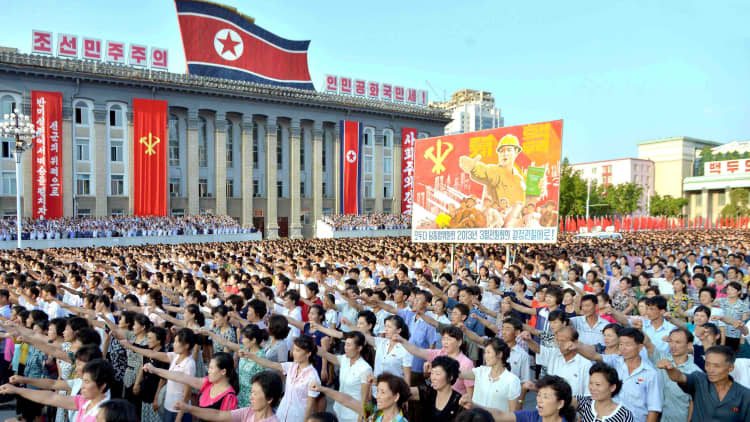
When it comes to rising tensions around North Korea, Goldman Sachs said markets eventually expect talks rather than militaristic conflict.
"Markets have been pricing a diplomatic outcome," Charles P. Himmelberg, head of global credit strategy at Goldman Sachs, said in a Wednesday report with two other analysts.
"For decades, complacency has been the 'right trade' when it comes to North Korea," the report said. "Our sense is that investors have grown comfortable with the view that geopolitical tensions invariably result in diplomatic talks, in which case the right trade is to buy any dips. The result is a market psychology that is relatively resistant to the pricing of geopolitical risk."
The S&P 500 has fallen more than 1 percent this week amid a flurry of intense statements by both the U.S. and North Korea.
On Tuesday, President Donald Trump's warned the U.S. will react to any North Korean threats with "fire and fury." North Korean state media then said it was "carefully examining" a plan to strike the U.S. territory of Guam in the Pacific. The headlines followed a report earlier Tuesday that the rogue state has successfully created a miniaturized nuclear weapon designed to fit inside its missiles.
Trump hardened his stance on North Korea Thursday, telling reporters that his "fire and fury" statement maybe "wasn't tough enough."
The "escalating war of words over the past 24 hours between the U.S. and North Korea has caused a modest repricing of Korean risk assets and global safe havens," Himmelberg said.
But he noted that South Korean derivatives markets for stocks and currencies do not show significant concern about geopolitical risk. "Even though tensions continue to mount and North Korea's nuclear program continues to advance, it appears markets have yet to see enough evidence that this time is different," he said.
As of Thursday afternoon, U.S. stocks remained about 2 percent or less below of their all-time highs and gold, a safe haven asset, climbed to only a two-month high. Even the South Korean KOSPI stock index remained within 4 percent of the record high hit on July 25.
Markets may not be far off when expecting diplomacy over conflict.
State Secretary Rex Tillerson said Wednesday that he does not believe there is an imminent threat from North Korea.
China — seen by many as having significant sway over North Korea — repeated in a Wednesday statement its call for involved parties to work toward "the right track of dialogue and negotiation."
More than two-thirds of North Korean trade is with China, but Beijing would rather maintain the status quo. That would prevent the collapse of the rogue state and avoid a potential influx of refugees over the border.
To be sure, price action may be hiding the true story, especially as fresh statements from North Korea and President Trump added to the tense situation.
"We still suspect that investors are more concerned than markets reveal," Himmelberg said.
Hedge funds have piled into the South Korean five-year credit default swap as insurance against fallout from a North Korean nuclear attack. On Thursday, the cost of protection climbed to 64.95 basis points, up 11 percent for the week and its highest since May 2016.
Source: S&P Capital IQ
WATCH: What Reagan would do about N. Korea



